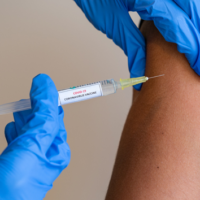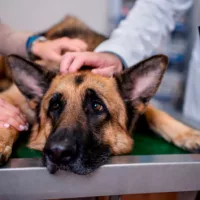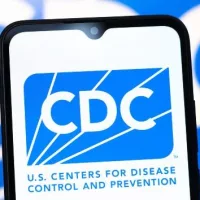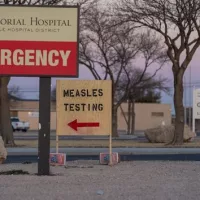
(NEW YORK) — When the Food and Drug Administration (FDA) granted full approval of the Pfizer COVID-19 vaccine for people ages 16 and older Monday, it did so with a warning to parents and medical providers.
The vaccine — the first covid-19 vaccine to transition from an emergency authorization status to full FDA approval — should not be given to young children as off-label use, according to FDA commissioner Janet Woodcock.
“We do not have data on the proper dose, nor do we have the full data on the safety in children younger than what is in the EUA, and so that would be a great concern that people would vaccinate children,” Woodcock said. “We are not recommending that children younger than age 12 be vaccinated with this vaccine, it would not be appropriate.”
“They are not just small adults,” she said of kids. “And we’ve learned that time and time again and so we really would have to have the data and the appropriate dose before recommending that children be vaccinated.”
Dr. Robert Frenck, lead investigator of the COVID-19 vaccine trials at Cincinnati Children’s Hospital, emphasized that clinical testing has not yet been done in 5 to 12-year-olds.
It’s likely that young children ages 5 to 12 will get a smaller vaccine dose. That’s not only because children are smaller, but also because they tend to have stronger immune responses than adults, Frenck said.
“In kids 5-12, we found that 10 micrograms, so one-third of the [adult] dose, gives you the same immune response,” Frenck said. “If they give it off label, and they give the 30 mg, I think they’re going to have kids in the 5 to 12-year-olds that are going to have a lot more reactogenicity. That means they’re going to have kids with fevers, headaches, and they’re going to feel bad.”
“As scientists we want to know,” Frenck said. “You don’t want to guess.”
The American Academy of Pediatrics (AAP) also urged caution, noting that while it is now “legally permissible” for doctors to administer the vaccine off-label for kids ages 11 and younger, the AAP “strongly discourages that practice.”
Pfizer’s COVID-19 vaccine was authorized for use in children ages 12 to 15 in May by the U.S. Food and Drug Administration (FDA).
The two other COVID-19 vaccines available in the United States, Moderna and Johnson & Johnson, are currently available for anyone 18 years and older in the U.S. Moderna filed for emergency use authorization with the FDA for its vaccine in adolescents in June but is still awaiting a decision.
Here is what parents may want to know about the COVID-19 vaccines and kids to help them make decisions.
1. What is the science behind the COVID-19 vaccine?
Both the Pfizer and Moderna vaccines use mRNA technology, which does not enter the nucleus of the cells and doesn’t alter human DNA. Instead, it sends a genetic “instruction manual” that prompts cells to create proteins that look like the outside of the virus — a way for the body to learn and develop defenses against future infection.
The Johnson & Johnson vaccine uses an inactivated adenovirus vector, Ad26, that cannot replicate. The Ad26 vector carries a piece of DNA with instructions to make the SARS-CoV-2 spike protein that triggers an immune response.
This same type of vaccine has been authorized for Ebola, and has been studied extensively for other illnesses — and for how it affects women who are pregnant or breastfeeding.
Neither of these vaccine platforms can cause COVID-19.
2. What is the status of vaccine eligibility for kids?
Pfizer has said it will submit vaccine safety data on 5- to 11-year-olds by the end of September. Moderna has said it will do so in the middle of the fall. It will then be up to the FDA on how quickly it grants the authorization.
In general, federal and industry officials said they expect the first vaccine shots for children ages 5-11 could happen by the end of this year or early 2022. Timing on a vaccine for children younger than 5 is less certain, but officials have said they hope a green-light for toddlers and infants will follow soon after.
Clinical trials are however still ongoing, and the FDA has signaled it wants to expand the pool of children signed up as volunteers. A larger pool of volunteers makes it more likely that even the rarest of side effects could be detected before it rolls out nationwide.
3. Why do kids need to be vaccinated against COVID-19?
While have not been as many deaths from COVID-19 among children as adults, particularly adults in high-risk categories, kids can still get the virus and just as importantly, they can transmit the virus to adults.
The American Academy of Pediatrics reported this week that children now make up 22.4% of all new weekly cases, and over 3.7 million children have been diagnosed during the pandemic.
“There are really two big reasons why kids need to get the vaccine,” explained Dr. Jennifer Ashton, ABC News chief medical correspondent.
“One of them is that it is possible that they could be infected and then unknowingly pass COVID-19 to someone with a serious or underlying, pre-existing medical condition,” she said. “And also, though it’s very uncommon and unlikely, it is still possible that children infected with COVID-19 could become seriously ill or worse. We have seen that.”
“It’s important to think in ripple effects, outside the box,” Ashton added. “It’s not just your home environment that you need to worry about.”
4. Will kids experience the same vaccine side effects as adults?
Adolescents experienced a similar range of side effects as seen in older teens and young adults — generally seen as cold-like symptoms in the two to three days after the second dose — and had an “excellent safety profile,” Peter Marks, director of the FDA’s Center for Biologics Evaluation and Research, said at a press briefing announcing Pfizer’s authorization.
“Based on all this available information, the FDA determined the Pfizer-BioNTech vaccine has met all of the criteria required to amend the EUA, which concluded that the known and potential benefits of this vaccine in individuals 12 years of age and older outweigh the vaccines known and potential risks,” Marks said.
Marks encouraged parents who were hesitant to vaccinate their children to speak with their pediatricians, urging confidence in the trial and data.
Moderna said its COVID-19 study with teens ages 12 to under 18 identified no “significant safety concerns.” The most common side effects from the vaccine were injection site pain, headache, fatigue, muscle pain and chills, according to the company.
The FDA will scrutinize Moderna’s clinical data before authorizing the use in anyone under 18.
5. Have there been any vaccine side effects for teens and young adults?
There have been more than 300 confirmed cases of heart inflammation in teens and young adults who have received COVID-19 vaccines, but the nation’s leading health experts say the Pfizer and Moderna vaccines remain safe for use.
Dr. Rochelle Walensky, director of the Centers for Disease Control and Prevention (CDC), said on “Good Morning America” in June the benefits of the vaccine for young people “overwhelmingly outweigh the risk,” echoing the findings of researchers at a CDC advisory committee meeting this week on vaccines.
Out of more than 26 million doses given to young people, the CDC has so far confirmed 323 cases of heart inflammation, called myocarditis or pericarditis, and is still monitoring more cases. Of the confirmed cases, the vast majority were temporary and resolved with monitoring and treatment.
“To put this in perspective, if we have a group of 12 to 17-year-olds who we’re working to vaccinate over the next four months and can vaccinate 1 million of them, which would be great strides, over the next four months we could expect 30 to 40 of these mild self-limited cases of myocarditis,” Walensky said on “GMA.” “And for that, if we were to vaccinate all 1 million we would avert 8,000 cases of COVID, 200 hospitalizations, 50 ICU stays and one death.”
The rare instances of heart inflammation occurred about 12.6 times out of every million second dose administered and were mostly among younger males about a week after the second dose of the Pfizer or Moderna vaccines, according to researchers at the CDC advisory committee.
Regulators at the Food and Drug Administration (FDA) say they are preparing a warning to go along with the Pfizer and Moderna vaccines to make young people aware of the very rare risk.
6. How effective are the vaccines in children?
Pfizer announced in late March that its clinical trials showed the vaccine was safe and 100% effective in children ages 12-15, similar to the 95% efficacy among adult clinical trial participants.
Marks confirmed on May 10 that after a trial with over 2,000 children, Pfizer found no cases of infection among the children who had been given the vaccine and 16 cases of infection among the children who received a placebo.
No cases of COVID occurred in the 1,005 adolescents that received the vaccine, while there were 16 cases of COVID among the 978 kids who received the placebo, “thus indicating the vaccine was 100% effective in preventing COVID-19 In this trial,” said Marks.
Moderna’s COVID-19 vaccine is 100% effective in children ages 12 to under 18, the company said last month, in announcing results of their latest clinical trials.
In addition to its efficacy, the vaccine showed “no significant safety concerns” in the trial of more than 3,700 adolescent participants, according to Moderna.
7. Will kids get the same dose of the vaccines as adults?
The FDA has authorized the same dosing for 12- to 15-year-olds as adults with the Pfizer two-dose vaccine.
Pfizer is currently testing smaller doses of the vaccine in children ages 11 and under.
8. Could COVID-19 vaccines impact puberty, menstruation?
There is currently no clinical evidence to suggest the vaccines can have long-term effects on puberty or fertility, according to Ashton, a practicing, board-certified OBGYN.
Ashton noted that while there has been anecdotal discussion of the emotional event of finally receiving the vaccine temporarily impacting menstruation for adult women, the idea of the cause being from the vaccine itself “defies science and biology.”
It is really important to understand basic biology here,” Ashton said. “Women can have changes in their menstrual cycle and also have gotten the vaccine, that does not mean that one caused the other.”
“Right now there is no puberty concern. There is no fertility concern,” she added.
9. Will the Johnson & Johnson COVID-19 vaccine be available for kids?
Johnson & Johnson announced in April that it had begun vaccinating a “small number of adolescents aged 16-17 years” in a Phase 2a clinical trial.
As of April, the trial was enrolling participants only in Spain and the United Kingdom, with plans to expand enrollment to the U.S., the Netherlands and Canada, followed by Brazil and Argentina.
10. Will COVID-19 vaccines be required by schools?
It will be up to each state’s government to decide whether a COVID-19 vaccine is required for school entry. Many colleges and universities in the U.S. have announced they will require students to be vaccinated from COVID-19.
Copyright © 2021, ABC Audio. All rights reserved.















